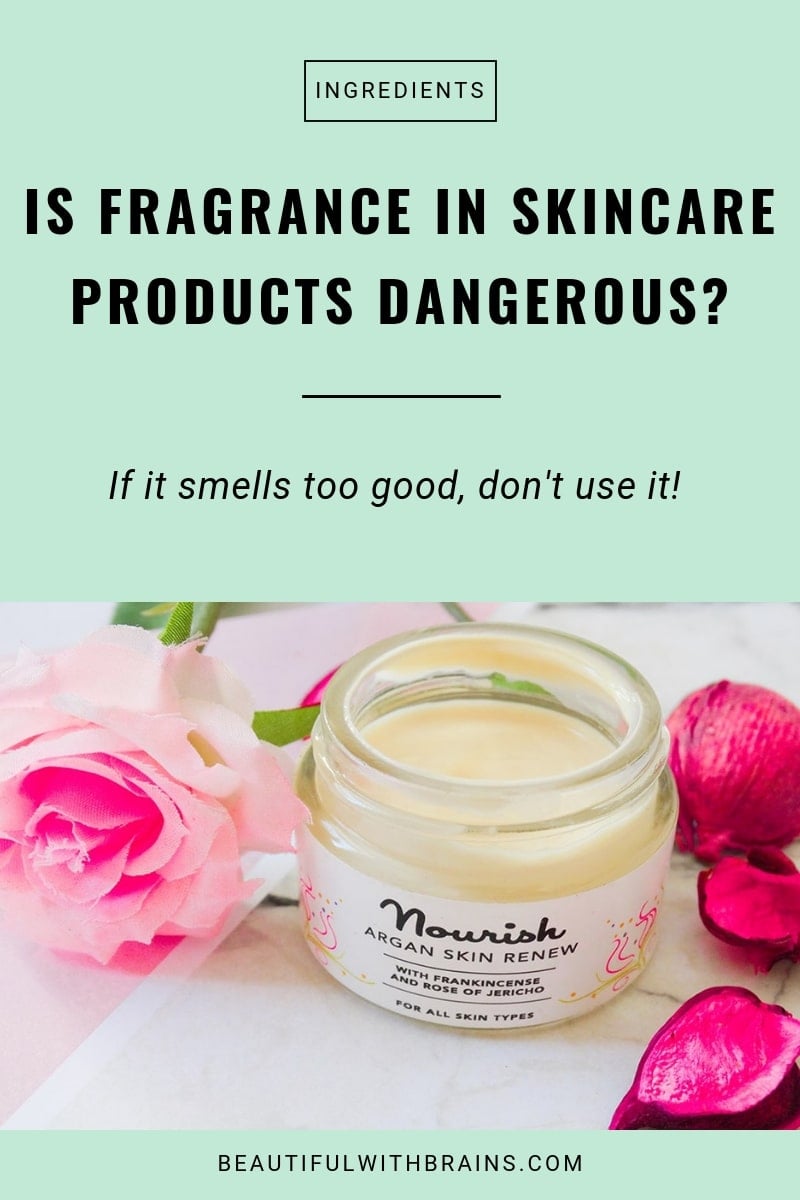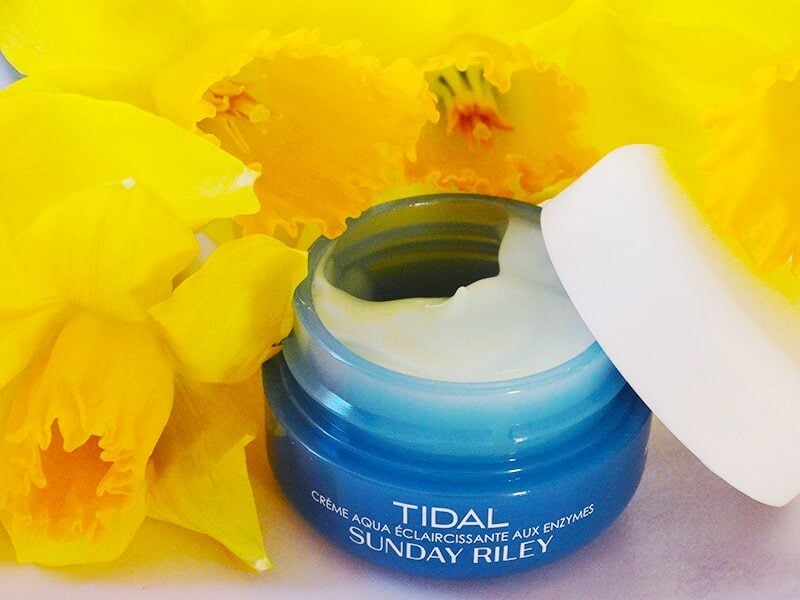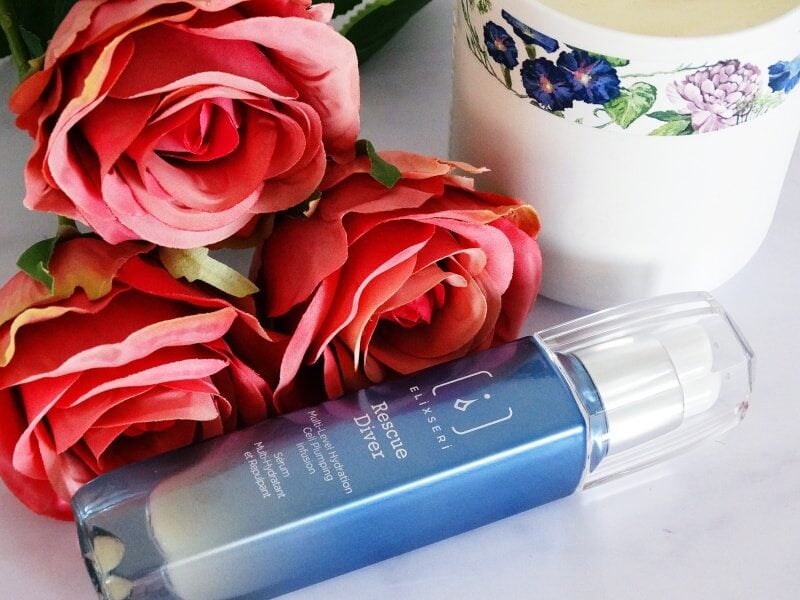
I have a weird skincare rule: if it smells good, I don’t put it on my skin.
No, I don’t like using products that stink (hello, Skinceuticals CE Ferulic!). And yes, I dig a beautiful fragrance as much as anyone else.
But everything has its time and place. And your face isn’t the place for perfume. Especially if you have sensitive skin.
Here’s why fragrance in skincare products is bad news for your skin:
What Is A Fragrance?
That little thing that makes you smell oh-so-good.
But, you know lawmakers. They always have to complicate stuff. Those who make the rules in the beauty world give fragrance two meanings:
- A scent, made of a mixture of essential oils and aroma compounds, fixatives, and solvents that you wear on your body to make it smell good.
- A scent added to a beauty product to neutralize the nasty odours of its ingredients (yes, chemicals smell, too).
Want to know what ingredients you really need to avoid in your skincare products? Sign up to the newsletter below to receive the “Skincare Ingredients To Avoid” cheatsheet:
Why Is There Fragrance In Skincare Products?
To get you to buy them.
Because,that bottle of Skinceuticals CE Ferulic may do wonders for your skin, but its funky smell will send you looking for a dupe faster than you can say “Ewww” (if the price hasn’t done that already, that is).
No one wants to use something that stinks. Heck, even people who get skincare, like dermatologist Marko Lens, founder of Zelens, sneaks in the tiniest amount of fragrance in the products to mask the stink of their ingredients.
There’s a sneakier reason, too.
Fragrances tug on your heartstrings. When you smell that Bath & Body Works Apple Pie Body Wash, you instantly think of your grannie’s delicious homemade apple pie. And off in your cart the body wash goes.
The right scent can also make you relax. Or invigorate you. Or put you in a cheerful mood. A scented cream is more than a cream. It’s an experience.
Related: My Fave Dupe For Skinceuticals CE Ferulic

Is Fragrance Bad For Skin?
A fragrance may be an experience… One your skin would rather avoid! Especially if you have sensitive skin or suffer from eczema and psoriasis.
Here’s why: Fragrance is one of the most irritating and allergenic ingredients in your lotions and potions. It can trigger:
- Allergies
- Asthma
- Eczema
- Headaches
- Hives
- Irritations
- Nausea
- Psoriasis
Ouch! What makes fragrance so irritating?
Its complexity. Every fragrance – be it natural or synthetic (yep, essential oils, too!) are made up of 50-100 chemicals. The more ingredient a scent has, the higher the chance something in there will irritate your skin.
P.S. Fragrances are considered trade secrets, so brands don’t have to disclose all the ingredients that make them up. But they DO have to disclose known-allergens. Like linalool. That’s why you always find it at the ends of labels. It’s not there to moisturize your skin or fight your wrinkles. It’s part of the cream’s fragrance. The nasty one that could give you a rash.
Related: What To Do When You Get A Negative Reaction From A Skincare Product
Type Of Fragrances In Skincare Products
You’ll find three types of fragrances in skincare products:
- Synthetic fragrance: Made up 20+ ingredients, it uses mostly petrolchemicals, phthalates and benzene derivatives. No, they’re not as toxic as the natural brigade makes them out to be, but they can be irritating. It’s listed as “fragrance,” “perfume,” or “parfum” on the ingredient list.
- Natural fragrance: Extracted from natural ingredients, like citrus fruits and flowers, through distillation, fermentation, or cold pressing. Don’t think for a moment it’s safer than synthetic fragrance. It can still trigger a bad reaction in sensitive skin. It’s usually listed as “natural fragrance” with the allergens (like citral and limonene) mentioned separately.
- Essential oil: This is the WORST type of fragrance you can use on your skin. Extracted from the flowers, seeds, and leaves of plants, fragranced essential oils are common allergens that easily trigger negative reactions (especially when used in high doses or with man other essential oils). You’ll find their name on the ingredient list with the allergens listed separately. For example, lavandula angustifolia oil, citronellol, limonene.
No matter what type of fragrance is lurking in your skincare product. ALL fragrances are bad for sensitive skin.
Related: 7 Natural Ingredients That Can Irritate Sensitive Skin
Should You Worry About Fragrance In Skincare If Your Skin Isn’t Sensitive?
So, fragrance is one of the most irritating ingredients in skincare. But what if your skin doesn’t have a problem with it?
Some experts claim you still shouldn’t use it. According to Paula’s Begoun, fragrance is the devil incarnated who will destroy your skin from within. On her website, she writes:
“You might very well be thinking that because your skin doesn’t show signs of being bothered or aggravated by the fragranced products you’re using, then it must not be a problem that applies to you. We wish that were true but it’s still a serious concern because skin is very good at hiding when it’s being aggravated. You might not see the damage on skin’s surface, but it can be silently occurring every day, causing minor problems for your skin in the short term and worse problems in the long term.”
Her reasoning is simple: fragrance causes inflammation in the deeper layers of your skin, where you DON’T see this. This inflammation causes damage that shows up later in the form of dark spots and wrinkles.
But… is that true?
Truth bomb: there’s no proof (yet!) that, in the small concentrations used in skincare, fragrance causes inflammation deeper into your skin.
So why do Paula and other experts think it does? They’re basing their opinions on studies done in vitro with higher concentrations of fragrant ingredients.
But applying a big dollop of fragrance directly on living cells in a Petri dish is NOT the same as applying a tiny amount on healthy skin protected by a layer of dead cells. The first approach is more likely to cause irritation.
Even so, I still recommend you opt for fragrance-free products whenever possible. Fragrance may not cause any serious harm on healthy, non-sensitive skin, but it has no benefit either. Why use it?

But Wait! Don’t Fragrance-Free Skincare Products Smell Too?
I don’t think I’ve ever come across an odourless cream. As I’m sure you know, every ingredient has its own odour (and not all of them smell nice…).
If your nose detects a scent coming from a fragrance-free skincare products, know that all you’re smelling are the ingredients. No artificial fragrance was added to the mix.
But wait… If every cream has its own scent, how can brands get away with labelling their creams “fragrance-free” or “unscented”?
Easy. Remember the second definition of fragrance I mentioned above? Here it is again: something that was added to mask the smell of the ingredients.
If you don’t add an artificial scent, you can label your products “fragrance-free”.
If you have sensitive skin, stick to these. They’re safe for you.
The Bottom Line
Fragrance is one of the most irritating ingredients in skincare. If you have sensitive skin or a broken skin barrier, avoid it like the plague. Everyone else, no need to be too worried about it. Fragrance won’t destroy your skin like Paula Begoun says. But it has no benefit, either. As it doesn’t help my non-sensitive skin, I prefer to avoid it anyway.
What’s your take about fragrance in skincare? Share your thoughts in the comments below.

Great post! I personally prefer the fragrance free version as my skin is sensitive.
I enjoyed reading this, THANKS!
I am bookmarking this post. it’s really a great read. i prefer all things without fragrance if possible.
Dao: thanks. I prefer fragrance-free products too.
Nikki: you’re welcome. I’m glad you enjoyed it.
jojobs: I’m glad you like the post. I prefer fragrance-free products too although I find it hard to find them here.